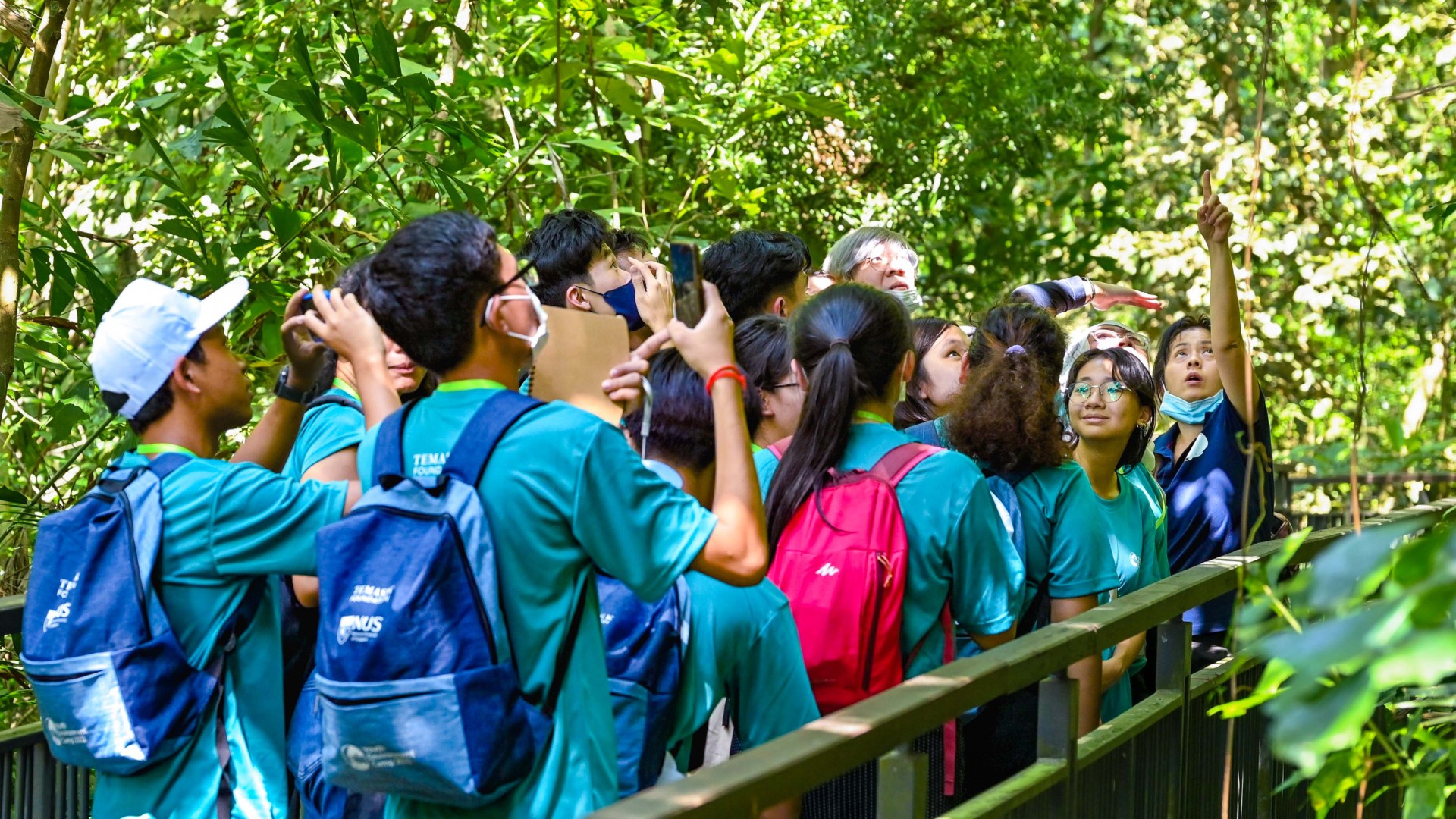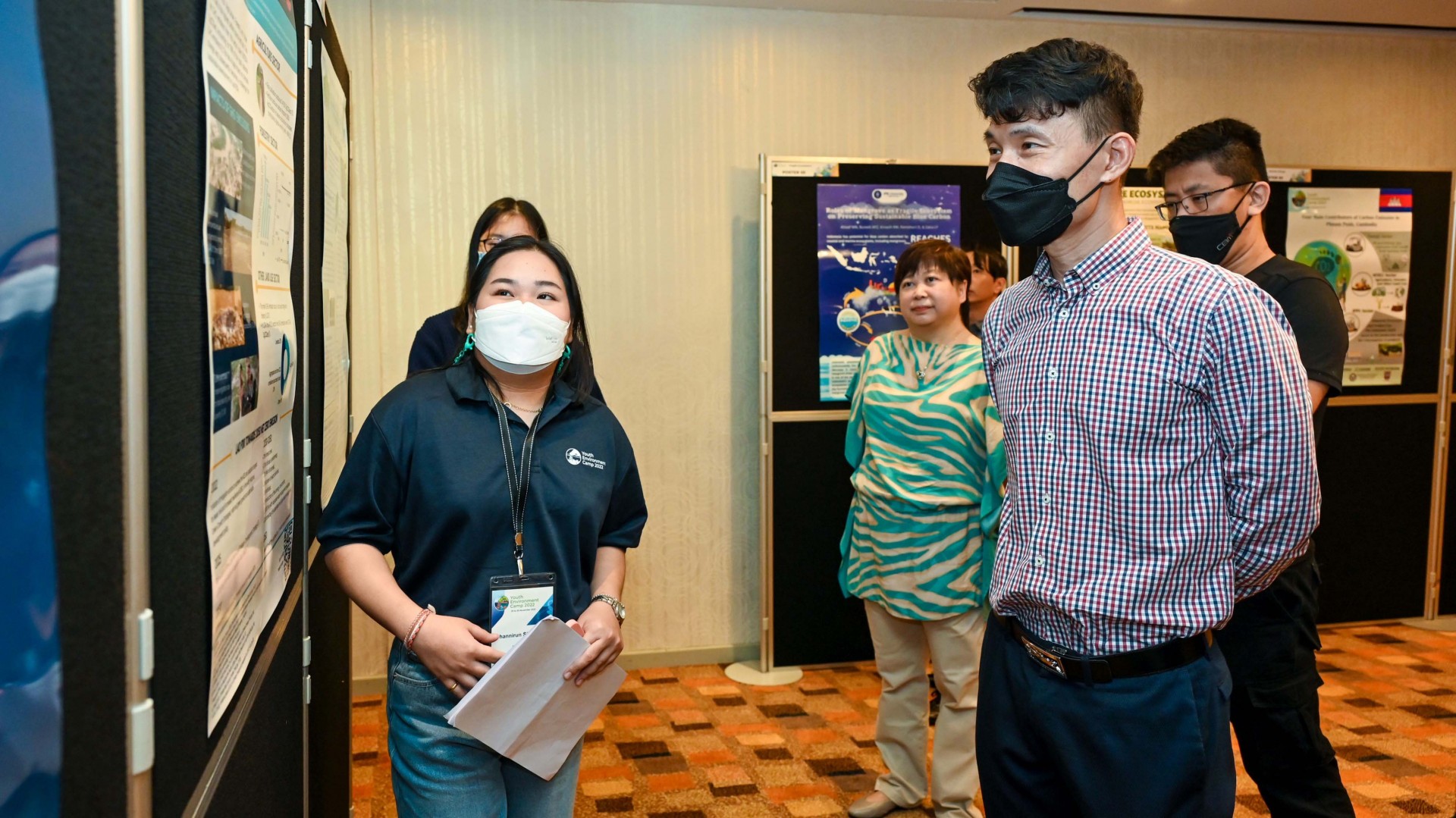ASEAN youth unite for climate action
On 21 November, 100 youths aged 17 to 21 from 10 ASEAN countries gathered in Singapore for the Youth Environment Camp (YEC) to discuss climate change and sustainability issues. This year’s camp centred around the region’s pursuit to reduce its carbon footprint. Through lectures, workshops and field trips, participants held meaningful dialogues on topics such as the challenges of decarbonisation, nature-based climate solutions, food waste management and carbon calculation.
Held virtually in 2021 due to the global pandemic, this year’s five-day residential camp inaugurated the event’s return to in-person activities. Participants could embark on experiential learning journeys for the first time in three years, exploring urban insect farm Insectta, Sungei Buloh Wetland Reserve and Singapore Discovery Centre. The camp — previously known as the STEP Environment Camp — was organised by the NUS Tropical Marine Science Institute and supported by Temasek Foundation. Since 2013, the programme has engaged more than 900 students in its quest to cultivate environmental awareness among ASEAN youth, emboldening them to collectively shape climate change and sustainability issues in the region.
Nurturing the next generation of sustainability champions
In his opening remarks, Guest-of-Honour Mr Baey Yam Keng, Senior Parliamentary Secretary at the Ministry of Sustainability and Environment and Ministry of Transport, underscored the merits of awareness and dialogue, and the role youth play in engendering environmental sustainability.
“Such hands-on experiences provide our youths with skills and knowledge beyond what is learned in the classroom and set them on the right foot to contribute actively towards a low-carbon future. As leaders and stewards of tomorrow, I encourage you to exchange your views and experiences, to work together for solutions, and rally your own communities to take greater climate action.”
Uniquely ASEAN – protecting blue carbon sources
Mr Baey’s sentiments were shared by Professor Miguel D. Fortes from the Marine Science Institute at the University of the Philippines, who delivered the keynote lecture, “Redefining the role of youth in environmental sustainability in ASEAN”. Giving an unvarnished look into the current environmental challenges of the region, Prof Fortes impressed the importance of granting youth a seat at the table, noting that they form the largest age group in ASEAN, making them a formidable force in animating their communities to propel the region’s sustainable development. Scientific literacy and inquiry, he said, are what will lay the groundwork for youth to “renew and refresh” society through leadership and innovation.
A citizen science and blue carbon specialist, Prof Fortes gave insights on blue carbon — how healthy mangrove forests, saltwater marshlands and seagrass meadows effectively store atmospheric carbon dioxide, and contribute to attenuating the effects of climate change. Drawing attention to how the ASEAN region possesses the greatest extent of latent blue carbon ecosystems in the world, Prof Fortes encouraged youth participants to “partner with science” in developing ecological and transdisciplinary ways of thinking to approach environmental sustainability.
Bringing what they learnt to life, the students had the chance to visit the extensive mangrove forest and mudflats at the Sungei Buloh Wetland Reserve. They discovered the biodiversity and ecological benefits of the wetland which is an important stopover for migratory shorebirds and home to wildlife such as mudskippers, mud lobsters, egrets and crocodiles.
Innovative solutions for a sustainable future
At Insectta, the first urban insect farm in Singapore, students were introduced to an innovative food waste solution: using black soldier flies to transform food waste into valuable biomaterials. In a hands-on activity, students had the chance to handle and examine the fly in its different life stages, giving them a glimpse into the future of sustainable waste management.
“[Using black soldier flies to process food waste] is an innovative idea to reduce wet waste and reap agricultural benefits,” said Ms Souphaphone Thammavongsa, a participant from Laos. “The camp has an amazing programme for youth to enhance their knowledge of carbon footprint and other environmental issues.”
Sustainable energy and food solutions were topics raised at a tour of Singapore Discovery Centre. Students saw how solar panels were utilised to generate power for around 60 per cent of the Centre’s electrical consumption, and the hydroponic technology harnessed to grow edible greens at an urban farm.
Hands-on workshops also acquainted students with a range of real-world applications. At a workshop conducted by Dr Li Xian, a scientist at the Institute of High-Performance Computing under the Agency for Science, Technology and Research, participants were provided a comprehensive overview of carbon calculation, including the carbon accounting standards used to measure greenhouse gas emissions of organisations. The workshop concluded with an activity that called for participants to calculate their own carbon footprint when attending conferences such as YEC.
Mr Khant Zin Thaw, a participant from Myanmar, felt that this activity made the theoretical personal. “I think this is the best way for youths to become aware of how much carbon is emitted from our daily activities. Moreover, I deeply understood our activities’ varying impact on the environment, and how effective action is needed.”
The camp culminated in a student symposium, where participants dialogued amongst themselves, presenting their views and solutions as an international and collective community.
“Your actions will determine the future of ASEAN,” Prof Fortes told participants, “and you must begin with overcoming the belief that you are too small to make a difference.”






